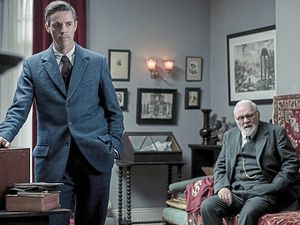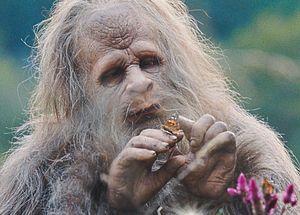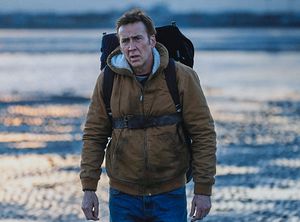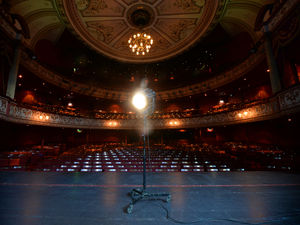Film Talk: Goode times for new drama, or a Freudian slip-up?
Sometimes it’s good to be good, but it’s always good to be Goode.

Star of Downton Abbey, The Crown and the 2008 adaptation of Brideshead Revisited, Matthew Goode is quite simply Mr English-Period-Drama-Smooth-Operator.
Yet, of course, there is more to the dashing cad that put the glint in the eye of Henry Talbot, Tony Armstrong-Jones and Charles Ryder than just being a handsome rake.
For proud members of the nerd herd, Goode will always be the man who brought life to Adrian Veidt, AKA Ozymandias, in Zack Snyder’s Watchmen.
This stunning 2009 adaptation of Alan Moore’s ground-breaking graphic novel saw Goode come to the fore as a young actor – shining as a sci-fi villain and doing complete justice to one of the comic-book world’s most sacred characters.
From there, the only way was up for our main man Matthew, with Goode bagging roles in Cemetery Junction, The Hatton Garden Job, and the absolutely outstanding The Imitation Game, before joining the cast of Downton.
Succeeding Dan Stevens admirably as a silky second true love for Lady Mary, Goode’s dashing driver set hearts across the land aflutter and his performance was applauded – hearts that continued to beat when the series ended as, thankfully, handsome Henry did not come to the same sticky end as his predecessor, despite his chosen vocation.
It’s good to be Goode, but sometimes it’s great – like when you get to star opposite one of our finest national treasures and statesmen of the silver screen.
With Matthew Goode and Sir Anthony Hopkins front and centre, Freud’s Last Session tells the tale of a fictional meeting between Sigmund Freud and Oxford don and future author of the Narnia series, CS Lewis. But is this a session that goes smoothly for our stars, or have our two titans made a Freudian slip-up? Time to get settled on the chaise-longue...
FREUD’S LAST SESSION (UK 12A/ROI 12A, 109 mins)
Released: June 14 (UK & Ireland, selected cinemas)
In 1939, shortly before his death in Hampstead, London after a painful battle with cancer of the jaw, psychoanalyst Sigmund Freud reportedly met with a don from the University of Oxford.
No one knows if that academic was author CS Lewis but playwright Mark St Germain imagined a meeting of these two brilliant minds in his award-winning stage work, Freud’s Last Session.
A stuffy and thoughtful film adaptation, co-written by St Germain and director Matthew Brown, still feels inherently theatrical, unfolding predominantly as conversations about faith, sexuality and human frailty in drawing rooms and offices.
As played by Sir Anthony Hopkins, Freud is abundantly aware that he is a walking contradiction, especially when it comes to his views on the sexes.
“I’m human. I’m inherently flawed, and I’m deeply damaged,” he notes. “And no doubt, I’m damaging to others.”
Hopkins savours the meaty dialogue and shares each morsel with a movingly understated Matthew Goode as Lewis.
There is plenty here to fire synapses, engage the brain and provoke debate, especially with scenes that depict Freud’s unwillingness to formally acknowledge a relationship between his daughter Anna and Tiffany heiress Dorothy Burlingham.
Emotional muscles aren’t flexed quite so forcefully and Brown’s picture feels standoffish for periods.
On September 3, 1939, the day that prime minister Neville Chamberlain formally announces Britain is at war with Germany, 83-year-old Sigmund Freud (Hopkins) invites CS Lewis (Goode) to visit him at home so they might discuss ideas expressed in the latter’s book, The Pilgrim’s Regress.
The novel is an allegorical response to John Bunyan’s 17th-century work The Pilgrim’s Progress and has been published after Lewis converted to Christianity.
The writer travels from his country home in Oxford, which he shares with companion Janie Moore (Orla Brady), into the capital where barrage balloons are already inflated to protect from airborne attacks.
“I always find it most convenient to be warned before being bombed or shot,” deadpans Freud.
The men’s discussion ebbs and flows between different topics, interrupted by an air raid siren that requires the two men to seek shelter in the basement of a nearby church.
Lewis suffers a panic attack, post-traumatic stress from the Somme, and Freud tenderly eases the situation. “Focus on me,” he soothingly instructs.
Meanwhile, Freud’s 43-year-old daughter Anna (Liv Lisa Fries) abandons her lecturing duties to seek morphine for her father.
Freud’s Last Session is distinguished by the verbal sparring between Hopkins and Goode, speckled with tender reminiscences including Lewis’s fraternal bond with JRR Tolkien (Stephen Campbell Moore), who has already published The Hobbit.
Stately production design conveys the return of conflict to Europe and stiff-upper-lipped resolve on British shores. Forays outside of Freud’s inner sanctum allow for welcome directorial flourishes to sporadically distance the film from its stage counterpart.
SASQUATCH SUNSET (UK 15/ROI 15A, 88 mins)
Released: June 14 (UK & Ireland, selected cinemas)

Sir David Attenborough has been the soothing voice of the natural history world for decades, introducing generations of viewers to the majesty of our blue planet and various species that exist in uneasy harmony with our self-absorbed and destructive species.
The veteran broadcaster has witnessed many extraordinary sights on land, in the sea and the air but it’s unlikely he will have ever seen a tribe of bigfoots urinating, lactating and defecating with wild delirium to mark their territory.
Bodily fluids overflow in filmmaking brothers David and Nathan Zellner’s hypnotic hike through the mist-cloaked forests of North America in the company of a ragtag tribe of human-like creatures.
These hirsute wanderers, portrayed by Jesse Eisenberg, Riley Keough, Christophe Zajac-Denek and Nathan Zellner clad in full-body foam latex suits fashioned by creature and prosthetics designer Steve Newburn, are initially untouched by the so-called developed world.
They graze contentedly on vegetation and bugs in wide open plains, lovingly comb fingers through each other’s fur to remove ticks and enthusiastically throw large stones into a river to catch an unfortunate fish. Over the course of four seasons, lovingly captured by cinematographer Mike Gioulakis as if this were a documentary, a mated couple (Eisenberg, Keough), an elder male (Zellner) and an energetic youngster (Zajac-Denek) contend with a predatory mountain lion, potentially poisonous mushrooms and the ferocity of the elements.
In amusing vignettes, one bigfoot gets high by sniffing the fur of a skunk while another creates an imaginary friend from his balled-up fist.
Gentle laughs are frequently undercut by stunned silence. Death comes quickly and matter-of-factly.
Grunts, whoops and guttural roars replace intelligible lines of dialogue but it’s easy to discern the bigfoots’ emotions from their actions like when they beat the trunks of redwood trees in unison to make contact with similar communities.
The sadness is palpable when the rhythmic calls go unanswered.
Austin-based experimental three-piece The Octopus Project, who have frequently collaborated with the Zellners, deliver an impressive and soaring score that combines cello, flute and synths with percussive field recordings taken during the pre-production process.
A euphoric burst of synth-pop duo Erasure’s 1991 hit Love To Hate You soundtracks one scene and elicits a strong reaction.
Expanded from the brothers’ 2011 short Sasquatch Birth Journal 2, which depicts (rather vividly) a female bigfoot bringing new life into the world in a woodland setting, Sasquatch Sunset is a curiously compelling oddity.
Minutiae of animal life can be a little repetitive but changing seasonal palettes and the influence of unseen humans feed the fascination.
Exemplary prosthetics and make up allow the cast to vanish beneath pungent pelts matted with every conceivable excretion.
Answering the call of the wild is exceedingly messy.
ARCADIAN (UK 15/ROI 15A, 92 mins)
Released: June 14 (UK & Ireland, selected cinemas)

Conceived by screenwriter Michael Nilon during the pandemic, Arcadian is a post-apocalyptic survival thriller that imagines a deadly virus knocking humans off their pedestals, eventually giving birth to gnarled, nocturnal beasts that hunt our ravaged species under a cloak of darkness.
Director Benjamin Brewer’s picture unfolds through the eyes of a stricken, close-knit family rallying together against the otherworldly predators from a fortified farmhouse stronghold.
The claustrophobic set-up is eerily reminiscent of the 2017 psychological horror It Comes At Night starring Joel Edgerton and climactic scenes in A Quiet Place.
Nicolas Cage’s performances are usually the craziest element on screen but in Arcadian, the Oscar winner is surprisingly understated and effective as a father willing to sacrifice everything to protect his offspring.
He allows young co-stars Jaeden Martell and Maxwell Jenkins to shine although the script lumbers cast with occasionally clunky dialogue.





